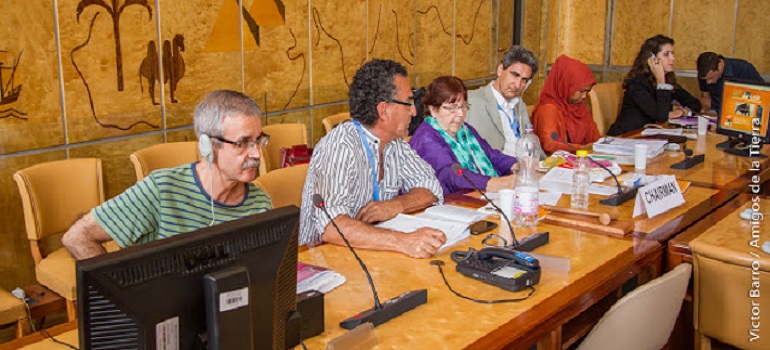
The first session of the intergovernmental working group on transnational corporations (TNCs), other business enterprises and human rights was held from 6 to 10 July 2015 in spite of adversarial maneuvers by Western countries. The CETIM was present, along with the Global Campaign to Dismantle Corporate and Stop Impunity, to give voice to the demands of social movements, victims and affected communities regarding the future legally binding international instrument.
This intergovernmental working group was established by the Human Rights Council in June 2014 and given the mandate of drafting a legally binding instrument to regulate, within the framework of international human rights law, the activities of transnational corporations (TNCs) and other business enterprises. It was a historic decision, coming after decades of discussions and fruitless attempts at the United Nations.
“historic decision, coming after decades of discussions and fruitless attempts at the United Nations”
Following an initiative by Ecuador and South Africa, the resolution was adopted by a modest majority of the Human Rights Council, with the support of most of the countries of the Global South and in spite of ferocious opposition from the Western countries, which refused – and continue to refuse – any binding regulation in this area. This Council initiative can, however, contribute to putting an end to TNC impunity for human rights violations, in particular in the Global South, and thus improve in the long term and at the global level the protection and the respect of human rights.
The resolution adopted by the Human Rights Council defines the work program of the intergovernmental working group for its first two sessions. These are to be devoted to discussions on the content, the scope, the nature and the form of the future international instrument. During the third, the negotiations will begin in earnest on the content of the instrument, on the basis of a proposal which will have been prepared by the Chair-Rapporteur of the working group.
At the opening of the first session, on Monday, 6 July, the Ecuadorian Ambassador, María Fernanda Espinosa, was elected chair of the working group. In her first words as President-Rapporteur, Ambassador Espinosa recalled that “the discussion within the United Nations on a regulatory framework for transnational corporations and other business enterprises regarding human rights goes back more than forty years, and it is on this basis that a new phase opens today with, for the first time, the launch of intergovernmental negotiations on the subject.”
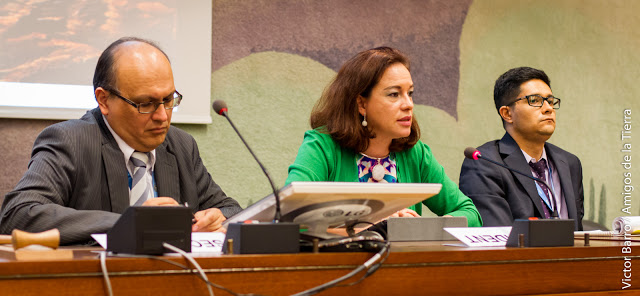
She further emphasized that “in a world in which nearly 80% of goods are produced through offshore production, by value chains which are in different national jurisdictions, it is important that there be, in the area of human rights, general and universal rules that are observed, in order to bring some security to all the actors: the states, the businesses, and, above all, the human beings who risk seeing their rights violated because of the abusive actions of businesses.”
Victoria Tauli Corpuz, United Nations Special Rapporteur on the Rights of Indigenous Peoples, was then asked to deliver an opening statement. She added her voice to those of other United Nations Special Rapporteurs (on health and on freedom of association) and Independent Experts (on foreign debt and human rights and on the promotion of a democratic and equitable international order), who spoke in favor of binding norms at the international level to end TNC impunity.
Ms Corpuz emphasized that “large scale corporate activities constitute today one of the most important sources of abuse of the rights of indigenous peoples in virtually all parts of the world.” She added that “while the global economic trends are increasingly characterized by dominance of corporations, their role extends beyond the capacities of any one national system to effectively regulate their operations”. Ms Corpuz pointed out that, on the one hand “foreign investors and transnational corporations are provided with very strong rights and extremely strong enforcement mechanisms [while] global and national rules dealing with the responsibilities of corporations and other forms of businesses are characterized by the form of soft law”.
“protecting human rights and holding TNCs responsible for their actions”
Worse, “the global reality for many communities, as well as states from all parts of the world, is that corporations today have the ability under international trade and investment law to sue states when they pass laws that aim to improve human rights and environmental protections.” Thus, Ms Corpuz showed her support for a legally binding international instrument to “contribute redressing gaps and imbalances in the international legal order that undermine human rights, [and] help victims of corporate human rights abuse access remedy”.
After this intervention, Ambassador Espinosa introduced the week’s work program. It had already been drawn up informally with members of the various regional groups as well as civil society organizations. The proposal was to organize the meeting around seven theme-oriented sessions (a half day per session), with, each time, a panel of experts to introduce the discussion then opening the floor to the states’ delegations and civil society in order for them to present their proposals and demands and to put questions to the experts. The first panel proposed dealt with the principles on which the treaty should be based. Then two panels dealing with the scope of the instrument were proposed, one on the subject of the actors to be targeted (transnational corporations and other business enterprises) and the other on the human rights to be covered by the instrument. Finally, four panels on the content of the future instrument followed, the first on states’ obligations, the second on the responsibilities of TNCs and other business enterprises, the third on the legal provisions to assure the responsibilities of TNCs and other business enterprises, and the fourth on the mechanisms to guarantee access to justice at the national and international level.
Obviously, this is still far from intergovernmental negotiations, for the objective of this first session was rather, as stipulated in the resolution adopted by the Human Rights Council (26/29), to have an initial constructive exchange, to solicit the competence and advice of the independent experts and to allow the various delegations to be informed about several of the main issues regarding the nature, the scope and the content of the future instrument, in order to lay the groundwork for the second session of the working group.
“attempt to derail the entire process”
The European Union (EU), however, seized the opportunity of the adoption of the work program to try to block the session and derail the entire process. It may be recalled that the EU, which as a block opposed the resolution’s adoption at the Council, had announced a series of conditions for its participation in the working group, in particular the naming of of a “neutral chair”, not limiting the scope of the instrument to TNCs, reaffirming the commitment of all to enforcing the Ruggie Principles, and to guaranteeing that the necessary experience and knowledge would be mobilized and that civil society and representatives of business would be properly consulted.
Among these conditions, the one referring to the naming of a neutral chair for the working group – in other words neither Ecuador nor South Africa – had generated considerable ill ease within the Palais des Nations diplomatic circles, including among some EU members. The usual practice is that the chair of a working group is held by a representative of one of the countries that presented the pertinent resolution to the Human Rights Council, in this case Ecuador or South Africa. All the intergovernmental working groups are chaired by ambassadors, but in this particular case, the EU demanded a neutral chair. And by “neutral”, should we understand “under its control” or under the influence of TNCs?
The name that had most circulated at that time was John Ruggie, the father of the Global Compact, which had opened wide the doors of the United Nations to TNCs, and author of the Guiding Principles on Business and Human Rights, both voluntary and non-binding, which allow the TNCs to monitor themselves and determine their own sanctions. John Ruggie had not failed, publicly and on several occasions, to express his skepticism – indeed, his opposition – to the drafting of binding international norms on TNCs and human rights. It was thus no surprise that the EU wanted him to chair the working group.
We know also that since the decision of the Human Rights Council in June 2014, the EU has exercised substantial pressure at the bilateral level on Ecuador and South Africa to dissuade them from accepting the working group chair and to persuade them to even abandon their initiative. The EU also put strong pressure on many countries of the Global South to compel them to withdraw their support of Ecuador and South Africa. These maneuvers failed, and the Ecuadorian and South African governments held firm.
Nonetheless, during the adoption of the work program, the EU attacked again, demanding an additional panel on the implementation of the Guiding Principles (whereas this is not included in the working group’s mandate), demanding also that the work program refer explicitly to all businesses and not only TNCs.
It should be noted in this regard that the resolution adopted by the Human Rights Council established that the instrument would cover TNCs and other enterprises, but a footnote clarifies that by “other enterprises” is meant those whose activities have a transnational character. This is an extremely important point which gave rise to heated discussions at the time of the adoption of the resolution: ought the treaty apply only to TNCs and other businesses with transnational activities or ought it apply to all businesses? The formulation proposed by the chair in the work program did not prejudge the outcome of these discussions, simply retaining the wording on transnational corporations and other businesses, but the EU was resolved to impose its position and to reverse a Human Rights Council decision, demanding that the work program refer to TNCs and all other businesses.
“the EU delegation left the room and did not reappear again throughout the entire week”
The session was suspended for several hours until finally a compromise was arrived at. An additional panel on the Ruggie Guiding Principles was to be added, but no change was to be made in the text concerning the scope of the instrument. With several hours’ delay, the session finally began, while the European Union delegation left the room and did not reappear again throughout the entire week! It had no doubt attained its objective of intimidation and disruption. The first two days were somewhat chaotic since it was necessary to compensate for the lost half day caused by the EU maneuvers.
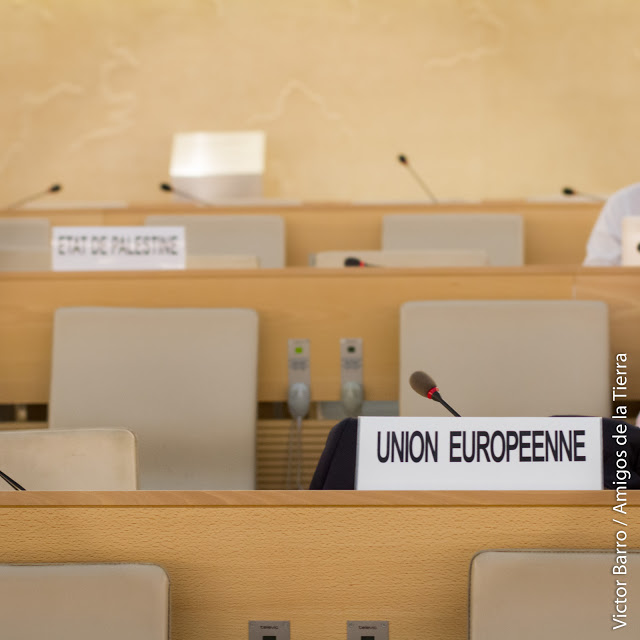
It would be unjust to censure only the European Union since, while several Western countries, such as Switzerland, participated as “observers”, most boycotted the session. Although the ferocious opposition of the countries of the Global North was no surprise, it is always striking and disturbing to note that these same countries, so active when it comes to the interests of TNCs in negotiating new free-trade and investment treaties, are recalcitrant when it comes to protecting human rights and holding TNCs responsible for their actions.
Apart from the Western countries, participation was entirely honorable for this sort of intergovernmental working group. The major emerging countries were present, Brazil, China, India, Russia and South Africa in the lead. There was also a considerable number of Latin American, African and Asian countries present. In all, some fifty delegations were present in the room throughout the full week, mainly to hear the experts and to gauge each other’s positions. Further, there was a major civil society presence, in particular representatives of social movements, victims and communities affected in the Global South, and they participated actively, in spite of the EU’s maneuvers.
“strong presence of social movements”
The CETIM was present, along with the Global Campaign to Dismantle Corporate Power and Stop Impunity, an international network comprising more than 200 social movements, networks and organizations of victims and of communities affected from throughout the entire world whose participation in the working group the CETIM supports. Some fifty delegates of the Global Campaign had made the trip to Geneva.
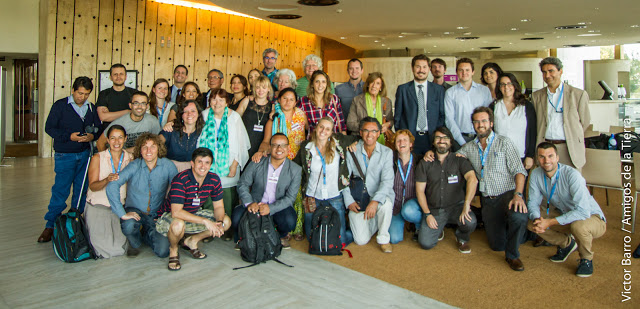
In collaboration with the Global Campaign, we organized a week of mobilization against TNC impunity, with at its center, on Wednesday evening, a major demonstration, in addition to a permanent presence throughout the week on the Place des Nations, with numerous activities, workshops etc. The mobilization week was also focused on the struggles against privatization of services, especially public services, for at the same time there was taking place at the Australian mission a new round of negotiations on the Trade in Services Agreement (TiSA), which would further reinforce the impunity and power of TNCs.
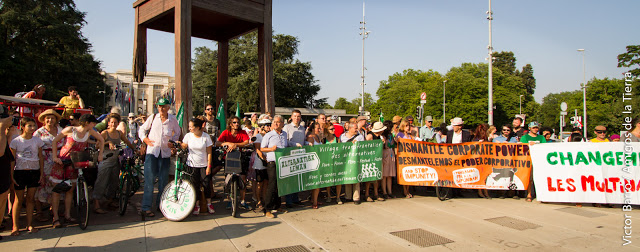
The CETIM and the Global Campaign actively participated in the working group session and presented many proposals. A written statement with eight proposals regarding the nature, the scope and the content of the future instrument was officially submitted to the working group in the name of the Global Campaign. This statement was formally signed by more than 100 organizations and social movements from throughout the entire world, including the international peasant movement La Via Campesina and the international umbrella group of public service trade unions Public Services International (PSI). It had been drafted with the support of the CETIM, on the basis of proposals contained in the draft Peoples’ Treaty of the Global Campaign drawing also on the results of an expert seminar organized in May 2015 in Geneva.
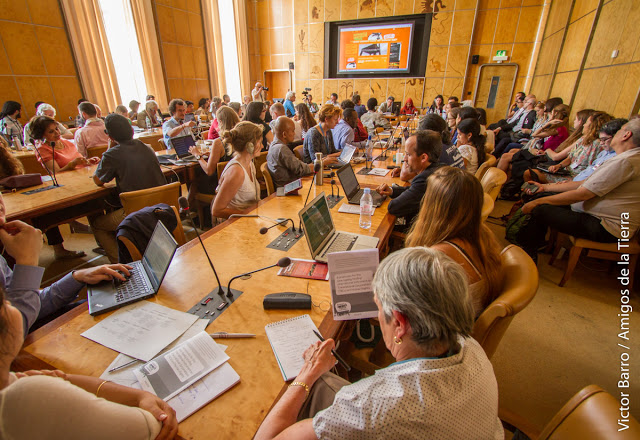
The session ended on Friday, 10 July 2015, with the adoption of the report and still without the presence of the European Union and the major Western countries. Nothing was decided at this stage, and the discussions will continue during the second session, no doubt in a format closer to “negotiations”. But simply that this first working group session took place was already something of a triumph! Of course, it is only the beginning of a long process, but it represents an immense step forward: for the first time and after more than 40 years of fruitless efforts at the United Nations, intergovernmental negotiations opened on new binding norms to end TNC impunity.
It will be only at the third session, in 2017, that the chair of the working group will present a text with proposals regarding the elements that the future treaty should contain, and that the intergovernmental negotiations on the heart of the matter will start in earnest.
For the time being, the report of the first session will be presented to the Human Rights Council in June 2016, and a second working group session will be held, probably in October 2016. In the conclusion of the report, the Ecuadorian Ambassador expressed her intention to organize consultations during the inter-session period and to undertake the drafting of a new work program to be presented at the next session.